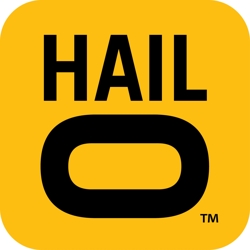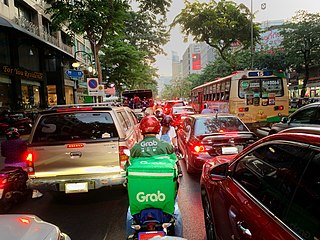
Uber Technologies, Inc. (Uber), based in San Francisco, provides mobility as a service, ride-hailing, food delivery, package delivery, couriers, and freight transportation. Via partnerships with other operators such as Thames Clippers (boats) and Lime, users are also able to book other modes of transport through the Uber platform in some locations. Uber sets fares, which vary using a dynamic pricing model based on local supply and demand at the time of the booking and are quoted to the customer in advance, and receives a commission from each booking. It had operations in approximately 72 countries and 10,500 cities as of December 31, 2021.

In New York City, taxicabs come in two varieties: yellow and green; they are widely recognizable symbols of the city. Taxis painted yellow are able to pick up passengers anywhere in the five boroughs. Those painted apple green, which began to appear in August 2013, are allowed to pick up passengers in Upper Manhattan, the Bronx, Brooklyn, Queens, and Staten Island. Both types have the same fare structure. Taxicabs are operated by private companies and licensed by the New York City taxi and Limousine Commission (TLC). It also oversees over 40,000 other for-hire vehicles, including "black cars", commuter vans, and ambulettes.

Taxis of Singapore come in two main varieties. Traditional taxi companies offer flag down and call bookings and their drivers are hired employees of the company. Ridesharing companies allow bookings through a smartphone, allowing ease for passengers, these are mostly known as private hire vehicles (PHV). Their apps also allow the flexibility to work and pick up passengers with their own vehicle, be it owned or rented, provided the various requirements are met depending on the company.

Taxis in Australia are highly regulated by each Australian state and territory, with each state and territory having its own history and structure. In December 2014, there were 21,344 taxis in Australia. Taxis in Australia are required to be licensed and are typically required to operate and charge on a fitted taximeter. Taxi fare rates are set by State or Territory governments. A vehicle without a meter is generally not considered to be a taxi, and may be described, for example, as a hire car, limousine, carpool, etc. Most taxis today are fueled by liquid petroleum gas. A2B Australia owns and operates the Cabcharge payment system, which covers 98% of taxis in Australia, and operates one of Australia's largest taxi networks.

Hailo was a British technology platform that matched taxi drivers and passengers through its mobile phone application. Founded in London in 2011, the Hailo taxi service was available in 16 cities.
Blacklane GmbH is a German company based in Berlin which provides a chauffeur portal connecting people to professional chauffeurs via their mobile app, website and hotline. The company offers a prebooking service at a fixed rate and doesn't own its own fleet, but works with local chauffeur companies in each of its cities. Airport pickups include one hour of free waiting time, while all non-airport pickups include 15 minutes. Guests can also edit or cancel their bookings for free up to one hour before a one-way transfer.

Ola Cabs is an Indian multinational ridesharing company, headquartered in Bangalore. It also operates in other business verticals including financial services and cloud kitchens.
Many communities, governments, and organizations have established rules and regulations that specifically govern ridesharing companies. In some jurisdictions, for-profit ridesharing operations are completely illegal. Regulations can include requirements for driver background checks, fares, the number of drivers, and licensing.

Grab Holdings Inc., commonly known as Grab, is a Singaporean multinational technology company. It is the developer of the Grab super-app, which provides users with transportation, food delivery and digital payments services via a mobile app. Grab currently operates in Singapore, Malaysia, Cambodia, Indonesia, Myanmar, the Philippines, Thailand and Vietnam. It is Southeast Asia's first decacorn, and the biggest technology startup in the region.
VentureCrowd is an Australian multi asset class crowdfunding platform, headquartered in Sydney, including equity crowdfunding, property crowdfunding and debt-based crowdfunding. VentureCrowd completed the largest Australian equity crowdfunding raise, $4.2 million, for taxi-booking and payment software company Ingogo in May 2015. This deal is ranked 8th on the List of highest funded equity crowdfunding projects. This deal is ranked 8th on the List of highest funded equity crowdfunding projects. In June 2016, VentureCrowd raised more than $900,000 for a Western Sydney residential project - a 35-lot development in Riverstone East, in partnership with the property developer ClearState. In August 2016, a second project raised $1,700,000 for a 44-lot development project in Austral.

Didi Chuxing Technology Co., formerly named Didi Dache (嘀嘀打车) and Didi Kuaidi, is a Chinese vehicle for hire company headquartered in Beijing with over 550 million users and tens of millions of drivers. The company provides app-based transportation services, including taxi hailing, private car hailing, social ride-sharing, and bike sharing; on-demand delivery services; and automobile services, including sales, leasing, financing, maintenance, fleet operation, electric vehicle charging, and co-development of vehicles with automakers. The company is a subsidiary of Xiaoju Kuaizhi Inc.
Careem is a Dubai-based super app with operations in over 100 cities, covering 12 countries across the Middle East, Africa, and South Asia regions. The company, which was valued at over US$2 billion in 2018, became a wholly-owned subsidiary of Uber after being acquired for $3.1 billion in January 2020. Careem expanded into the food delivery business with Careem Now in November 2018 and launched a digital payment platform, Careem Pay in April 2022.

Cabify is a Spanish ridesharing company which provides vehicles for hire via its smartphone mobile app. Vehicles are driven by self-employed service providers. Operating in Spain and Latin America, the company offers two services, one for businesses and another for individuals.

A2B Australia is an Australian public company which was listed on the Australian Securities Exchange in December 1999 and is an ASX 200 company. The company was founded by Reg Kermode. In 1976, the company established Cabcharge, an account payment system to provide a way to pay for taxi fares by non-cash means, which today is the sole provider of the in-taxi service.

Soothe is a multi-national wellness service provider based out of Los Angeles, California. The company allows users to request the services of a massage therapist, cosmetologists, and estheticians. Since its launch in 2014, the mostly mobile app-based company has received significant press coverage and has expanded its service area to include many cities and counties in the United States. It also provides services in Australia, Canada, the UK, Ireland, and Germany.
inDrive, is an international ride-hailing service with more than 150 million downloads operating in 47 countries. Headquartered in Mountain View, California, it is the second largest ridesharing and taxi app worldwide by downloads. The company was officially launched in 2013.
Green Tomato Cars is a London-based taxi service that focuses on being environmentally friendly. Customers can order a taxi by phone, through the company's website, or by using a smartphone app, similar to Uber. They were the first car service in London to operate the Toyota Prius as their flagship car, and the first to use the Toyota Mirai – a hydrogen fuel cell zero emissions vehicle. As of 2019, Green Tomato Cars had a fleet of more than 600 Toyota Prius hybrids, and plug-in hybrid and zero emission executive cars. Chauffeur specialist Travelhire acquired Green Tomato Cars from Transdev in February 2019.
Beat operates a taxi and ride-hailing mobile app for smartphones and other mobile devices. Beat's headquarters are located in Athens, Greece. About 90 percent of the company’s ride-booking activity is in Latin America, where more than 250,000 drivers work with the app.

Flapper is a vehicle for hire company headquartered in Belo Horizonte, Brazil. Flapper operates a private aviation marketplace which provides per-seat bookings as well as whole aircraft charters.
Mega Cabs is a radio taxi service provider in India, present in six cities in India with a fleet size of 2,500 cars. The company was founded in 2002 by Kunal Lalani. It is one of the first radio taxi service providers in India.












